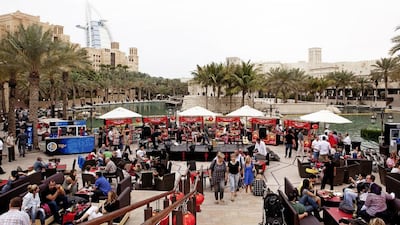Indulge in popular seafood treats from the Far East, including the Singaporean culinary favourite, the chilli crab, at the sixth edition of the Chilli Crab Festival. The outdoor event includes food stalls, cooking demonstrations and live entertainment, plus a build-your-own-burger stand for kids. From 4pm to midnight, Souk Madinat Jumeirah Amphitheatre, Dubai, 04 366 8888, www.jumeirah.com/mjchillicrab
Visit Downtown Dubai on the new, hydrogen-powered Dubai Trolley. The 1-kilometre zero-emission street tram is a hop-on, hop-off transit system that will eventually serve seven kilometres and currently offers access to several attractions, including the Burj Khalifa, The Dubai Mall and Souk Al Bahar. From 4pm to midnight, free, www.mydowntowndubai.com
Enjoy modern cuisine with a library area and a fusion shisha lounge at the casual and vibrant restaurant Avec, and when you spend Dh250, register for a chance to attend the Uefa Champions League final in Berlin in June, complete with flights and hotel accommodation.From 8am to 2am, ground level, Al Thuraya Tower 2, Dubai Media City, Dubai, 04 430 3700, www.facebook.com/AvecDubai
Register now for comedy classes from Dubomedy, including Stand-up Comedy 101 and Improv Comedy, plus a graduate class for advanced stand-up. Classes run for seven consecutive Saturdays and are taught by local comedians. Starting on May 2, various timings, Dh1,500 for Stand-up Comedy 101 and Improv Comedy, Dh600 for The Graduates 102, Jumeirah Lakes Towers, Cluster T, Dubai, 050 927 3621, lol@dubomedy.com
Join Gulf Photo Plus and submit your photographs that showcase the colours red, green and blue (RGB) in landscapes, portraits, abstract, street photography and more for the RGB exhibition. Submissions accepted until May 5, Alserkal Avenue, Al Quoz, Dubai, www.gulfphotoplus.com/rgb/submit
listings@thenational.ae

